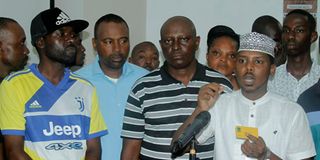Party primaries a clear indication of opposite Ruto and Raila styles of leadership

Ibrahim Dube, an aspirant in Tononoka Ward, displays his United Democratic Alliance membership card as several aspirants protest missing out in the voters’ registration list for UDA nominations on April 16, 2022.
Neither Raila nor Ruto has become president yet. Kenyans can only speculate about their leadership styles. Nominations of their parties give the best hints at their governance styles.
Everyone knew that in ODM, Junet Mohamed, James Orengo, Anyang’ Nyong’o, Otiende Amollo, Gladys Wanga and other big names would get direct tickets. Raila treasures loyalty over competition and merit.
In contrast, Ruto had told everyone that his party would conduct open nominations. But it can be argued Waiguru, Kang’ata, Murkomen and Ndindi got free tickets. But they were unopposed, hence the party had no option but to give free tickets.
ODM nominations have witnessed several instances of aspirants being denied an opportunity for open primaries, despite publicly pleading for competition.
ODM has publicly stated that it does not intend to conduct primaries in some elective seats this electoral cycle.
It stated that it would give prominence to other modes of picking aspirants, including opinion polls and surveys. These modes are opaque and subjective. For opinion polls, the party did not publicly disclose key markers of credible polling, including the sample size, the sampling procedure and the methodology used.
Best examples are in Homa Bay involving former Nairobi Governor Evans Kidero and in Siaya involving former Rarieda MP Nicholas Gumbo. Both were denied an opportunity to compete in free and fair nominations and, thus, defected from the Orange party.
Eschewing competition
The ODM stance of eschewing competition in this nomination cycle explains the support by ODM and its Azimio la Umoja partners towards a controversial amendment to the Political Parties Act that had made open nominations an impossibility.
One clause had provided that parties conduct nominations using registers certified by the Office of the Registrar of Political Parties. Practically, that office has yet to build capacity to generate such registers.
It took judicial independence for this clause to be suspended by a progressive court sitting in Machakos.
As a result, ODM, and Azimio generally, has the greatest number of recycled leadership. The party does not create space for new and fresh ideas. Incumbents have been favoured and given an unfair advantage.
In contrast, UDA nominations leaned heavily towards openness. That explains why the country almost came to a standstill on Thursday. Thirty-seven counties conducted nominations, despite huge bottlenecks. Hindrances included ballot transportation challenges arising from the fuel crisis.
The electoral commission plans for general elections for more than two years and spends about Sh50 billion. For a young party like UDA, which is a year old, to conduct national nominations is a major feat. Printing ballot papers; distributing voting materials; hiring personnel, including security forces; and creating result transmission systems demand dedication, energy and discipline.
Minorities
An open nomination process has several advantages. Voters have a variety of choices. Leaders, including those from marginalised sectors of society like women, minorities and the youth, who are unknown to the big honchos, have a chance of ascending to leadership posts.
UDA nominations were not perfect. Nothing is perfect. But at least the party gave an opportunity to the ordinary members to vote, despite having the legal mandate to use alternative modes.
The effect of these contrasting nomination styles caused youngsters like 25-year-old Linet Chepkorir, alias Toto, to get a leadership opportunity in UDA through competition.
Oburu Oginga, a former MP and Raila’s brother, had to get a free ticket and be recycled, while fair and open competition led to shock upsets for UDA bigwigs like Caleb Kositany and former Cabinet Secretary Charles Keter.
This gives a hint that a Raila presidency will give opportunities to the privileged few. It will choose loyalty over merit. It will favour opaque and vague processes. By contrast, Ruto will champion open and fair processes that allow the marginalised to get life opportunities. Ruto will choose fairness over friendship and prefer hard work to free-riding.
If one was enquiring about the definition of the “bottom-up” economic model, being championed by Ruto, this is it. Bottom-up means giving all an equal opportunity to rise, hence uplifting Chepkorir, alias Toto. But Raila giving a free ticket to his brother, Oburu, and helping him win through endorsement can only be a symbol of the trickle-down model.
Dr Irungu Kangata teaches law at Catholic University of Eastern Africa, is the Murang’a senator and a former Chief Whip of the Senate.





